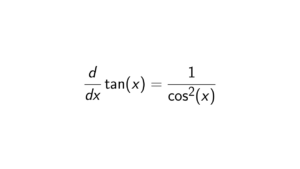Proof. Let F(x) = \sec(x) = \frac{1}{\cos(x)}, f(u) = \frac{1}{u} and g(x) = \cos(x) such that F(x) = f(g(x)). Then we will use the chain rule:
\begin{align*}
F'(x) = f'(g(x))g'(x).
\end{align*}\begin{align*}
f'(g(x)) = \frac{-1}{g(x)^2} = \frac{-1}{\cos^2(x)} \quad \text{and} \quad g'(x) = -\sin(x).
\end{align*}\begin{align*}
F'(x) &= f'(g(x))g'(x) \\
&= \frac{-1}{\cos^2(x)}\cdot(-sin(x)) \\
&= \frac{\sin(x)}{\cos^2(x)} \\
&= \frac{\sin(x)}{\cos(x)}\frac{1}{\cos(x)} \\
&= \tan(x) \frac{1}{\cos(x)} \\
&= \tan(x)\sec(x)
\end{align*}
